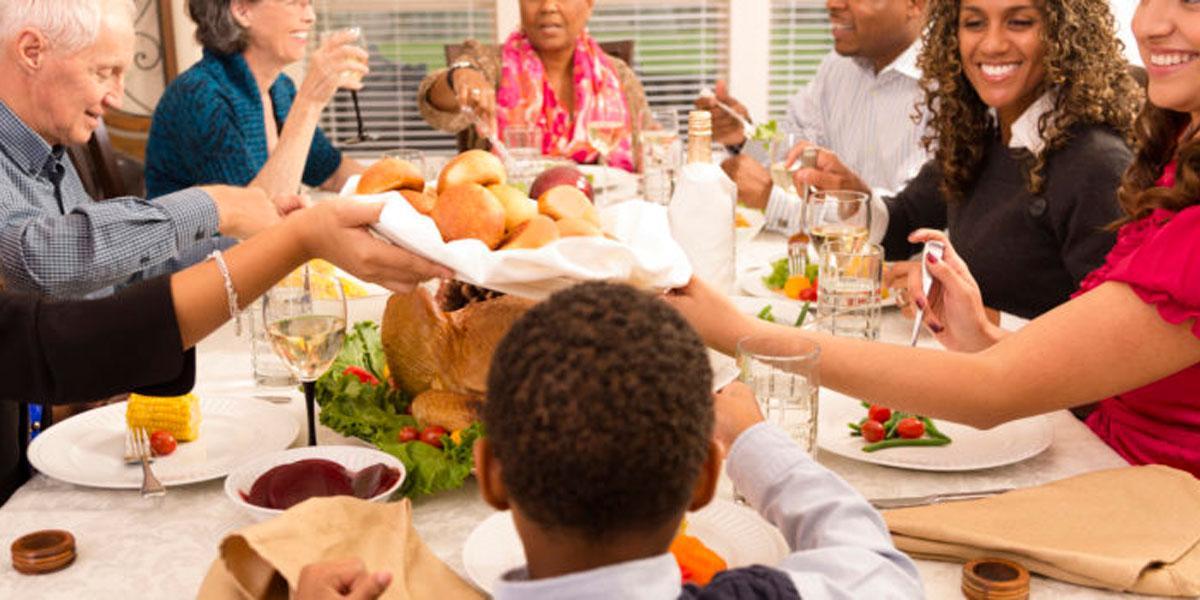The holiday season is officially kicking into high gear: Cue up the articles and shows about how to survive our family gatherings. After all, progressive Paul and conservative Carla who haven’t spoken since the presidential election last year will be there; Uncle Joe will surely have some racist and homophobic jokes to share; Lilly, fresh from her college feminism course, will be at the table espousing the removal of all men from positions of power and Darren, post-divorce, is coming with his new partner, who’s half his age. Laura the vegetarian will be schooling everyone on the dangers of their diets while Ralph will be drinking quietly in the corner—or maybe not so quietly.
Everybody ready?
But hold up: What if we stopped talking about just surviving holiday gatherings with friends, family, colleagues and neighbors and reset our goal for these occasions? What if instead of talking about “tolerance” we talked about connection, courage and compassion?
It was a post-Thanksgiving luncheon my son and his partner hosted that got me thinking about this. The food was good, but it was the menu of people that really caught my attention: we were mothers and fathers, uncles and aunts; black and white; immigrant and U.S.-born; young and getting older by the day; we were the middle class to the 1%, new acquaintances and long time relatives. My ex was there with his husband, and my former in-laws whom I adore were there too.
There was something so warm and compelling about being in each other’s company, breaking off into the familiar clusters, then branching out and re-clustering with others outside of our known circles. The differences didn’t divide, they enriched. It brought home to me the reality of the expanding definition of family today: What a miracle it is every time we actually manage to come together into one place from our many divergent paths and experiences. Sometimes I think we take these moments for granted and fail to notice that we have an amazing opportunity to widen and deepen our humanity when we join with our families, friends, and colleagues this holiday season.
So if, like me, you want not just to survive but transform your holiday encounters in the coming weeks, here are 5 rules to live by:
- Prepare! Think about the last gathering you attended, maybe even just last week, and review in your mind how it went. What did you do that you felt good about, and what were you ashamed of when you got home? Were you too aggressive, angry, anti-social or phony? Were there moments you wish you could do over again? Then set an intention for how you want to show up next time. If your cousin brought up Trump last time and you went ballistic, this time think about stepping out of the fight mentality. Instead of trying to convince your cousin that you’re right and he’s wrong, you could say “Hey look, this is always a bad scene, so why don’t you start with your view, I’ll listen, and then I’ll share mine and you can listen. And let’s agree that we’re not going to talk to destroy each other. When you’re listening, try to find something you can agree with and acknowledge it. When you’re stating your point of view, think about using the phrases “In my opinion” or “From my point of view as a…” it defuses the heated arguments when we admit that much of what we’re asserting, no matter how adamant we are about it, is just our perspective. And if a large group is going at it on some controversial issue, try saying, “Can we all agree no matter where we are in the conversation, we will only talk about this for 20 minutes and then we’ll take a break and serve the pie?” (It’s amazing what people are willing to let drop when there’s pie involved.)
- Assume everyone is valuable. Most of us are great at being superficially nice to people. But that’s not the same as believing all people can add value to your life. When we assume people are valuable, we’re open and curious. When we don’t, we stick with small talk, make assumptions, and move on. So, what if instead of staying in the chit-chat zone you asked people more unexpected, open-ended questions like, “What has your interest these days?” And then spend some time really listening. Ask follow up questions—and keep listening. We all can remember a time when we had a deep, unexpected conversation with someone that challenged our assumptions about them, and left us changed for the better. Go looking for that kind of conversation. And obviously, there is a line between curious and nosy, so don’t probe into people’s business unless they seem happy to share. But also remember to share yourself. You too are valuable. Be authentic about your story, your victories and your struggles. If it’s been a rough year for you, say so. Who knows? The person you’re talking to might have had a difficult time too, and your admission frees you both up to show each other compassion and understanding.
- Know your (diverse) audience. If we’re going to transform our holiday spaces, we have to create environments where more of us feel included and respected. Not every gathering is as beautifully diverse as my son’s luncheon was, but things are constantly changing in our families and communities. You never know who might show up to dinner: The Royal Family just learned that a multiracial, multicultural, feminist American actress is coming to their palace very soon. Call me crazy, but I’m assuming some things are going to change as a result. I’ve also noticed that even when people come from the same families and communities, they can have very different lives, narratives, and perspectives. So consider the language you use and what subjects you choose to talk about. Last week at that luncheon, for example, I was talking to my ex about his senior leadership position and the issues we’ve both faced in the corporate workplace. Only after I got home did I realize that our conversation could have been incredibly alienating to someone whose job offers little to no control, autonomy or power. It’s not that you have to avoid certain discussions completely; just be aware of how they might play in a mixed audience. Sometimes you don’t know the secret battles and identities in the room. Looking around and gauging reaction may give you a clue, though: If folks look bored or uncomfortable you can say, “Is this annoying? we can stop.” Or maybe say something that acknowledges awareness: “I know these are ‘high-rent’ problems, so I’m going to just shut up now.”
- Choose your words carefully when other people don’t. It wouldn’t be a holiday gathering without somebody saying something thoughtless or inappropriate, right? Be ready to speak up—but know how to do it in a way that won’t make the situation worse. The goal isn’t to humiliate the speaker; it’s to actually interrupt the behavior. So if your grandmother starts food shaming the young girl in the room about what she has on her plate, you can gently say, “Please don’t do that. We’re not policing anyone’s plates today. I know you love Dana, but that’s not helpful.” If someone tells a joke that demeans a group of people, you can say in the most curious tone you can muster, “Why is that funny?” If someone proclaims a stereotypical view as truth, you can kindly ask, “What do you mean?” or “Weird, that hasn’t been my experience.” Or you can use some of my favorite go-to expressions for preventing the flow of upsetting remarks: “Ouch,” “Really?” and “That’s just awkward.”And if you can’t do or say something in the moment, you can do it later, when you’re alone with the person: “I didn’t say anything at dinner, but it was hard to listen to you use that language. Did you think about the message it sends to the young folks at the table?” You might also go to the person who you suspect was upset by the remark, check in to let them know you heard or saw it too and ask them how they’re doing, or if you can help.
- Find the good and resist judgment. Some folks are non-judgmental by nature, but many of us struggle not to be critical of others. At family events, we often fall into our roles: biting jokes, critiques, limited expectations. We see people we haven’t seen in months or years and say things like, “I see you’re still smoking,” or “So have you found a job yet?” or “You still with that woman?” But we could decide to go into these occasions less judgmental, and committed to quitting the old ugly patterns. We could decide to show up with a smile and a compliment, noticing what is working: You’re glad they came. You love that dress. You wonder if they could help you with a problem you’re having because of a challenge they’ve overcome.
Holiday gatherings are way up there on the stress scale. There’s no getting around it. We can’t control every interaction, and there are some relationships and patterns that can’t be solved over turkey and pie (or gluten-free, vegan casserole). But I believe we can do better if we make a conscious effort to put our best heart and best mouth forward, and find more authentic community among our family and friends. If it doesn’t go perfectly, don’t stop trying. Every time we get closer, deeper and more vested in each other’s lives, we strengthen the bonds of family and community that we all need to lean on for the rest of the year.


